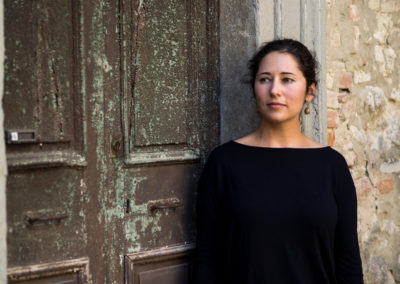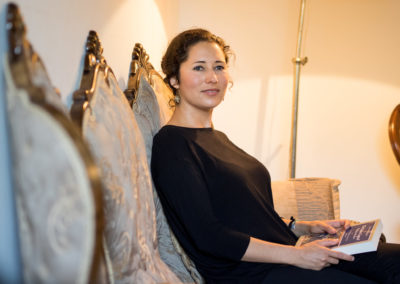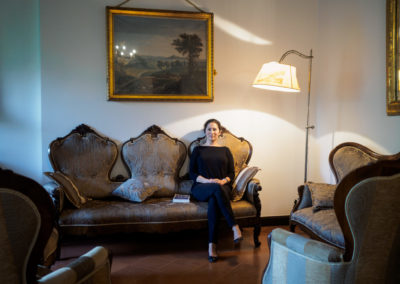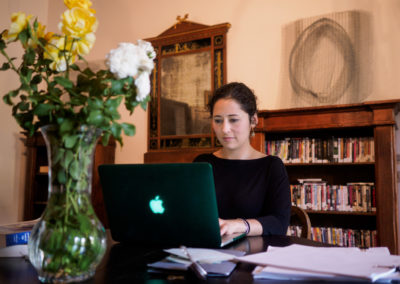My time at Civitella Ranieri was absolute heaven. During my six weeks, I wrote an essay, did final revisions on a short story, and made real headway on my novel. To be surrounded by such beauty and art and history and kindness was extraordinary. This place and the people I met here will remain with me always.
The following is the opening of the story I read in the Chapel. It appeared in The New Yorkershortly after my residency ended.
Christina the Astonishing (1150-1224)
How She Was Led Forth from the Body & How She Lived Again
The priest holds the host aloft, the linen sleeves of his alb falling around him like wings. He intones the Agnus Dei, and we sing with him. I can scarcely form the words, my throat is so clotted with grief. Beside me, my sister Gertrude tightens her grasp on my hand.
Agnus Dei, qui tollis peccata mundi—
Christina lies in her coffin, her cheeks sunken, her slender hands crossed over her heart. Now, with her troubled soul gone, Christina is easier to look at; alive, even in sleep, she kicked and growled and twitched. For the first time in the twenty-one years I’ve known her, my sister seems at peace. A grave awaits her in the churchyard, a hole sliced into the earth. Water pools in the cold mud at the bottom, flashing in the sunlight and reflecting the sky. We were five in our family, then three, and now we are just two, and even as I weep for our little sister I thank God that it is Christina in the coffin and not Gertrude, the sister I can’t live without.
Misesere nobis. Have mercy on us.
I think of our house on the edge of the village, hushed, veiled in honeysuckle. A thread of smoke rises faintly from the chimney, and the coals collapse into ash. I think of our lives as they will be from now on, tranquil and measured.
As the music rises around me, I’m enveloped in an unfamiliar sweetness, as if some acid has been drained from my blood. Even this morning, on the way to the church, I couldn’t help noticing the world was suddenly clean and raw, filled with new color and new light, everything unbearably radiant. I loved Christina, I did! I see this now. She was difficult, yes, unknowable, but I loved her. Generosity floods me, as clear and calm as well water—and gratitude, too, to God, who has let me weep for her.
I remember Christina as an infant, that fretful tense-limbed creature. While our mother sat at the spinning wheel, I rocked Christina, begging her to settle. “Hush, hush, just rest now,” I said, and put my finger in her little palm. She gripped it, but kept wailing. Now my whole body cries out to hold that memory of my sister’s hand around my finger.
We begin the third invocation:Lamb of God, who taketh away the sin of the world…We sing, edging closer and closer to that final entreaty: Dona nobis pacem. Grant us peace.
Perhaps if we’d hastened, outrun the melody, God might have listened. If we’d only gotten those last words out, He might have spared us our miracle.
Instead: flight. The congregation gasps. I open my wet eyes, the prayer dead on my lips.
How to make sense of this? The young woman up there in the rafters is no apparition. Christina was dead, and now she’s alive, eyes shocked and glittering. She perches above us in her gray shift, straddling the beam, dangling two thin legs. Her face is contorted, her color rising, as she wails down at us. She grips the beam, her long fingers pressed so hard against the wood—splintered and rough with adze marks—that after, they will be bloody.
We gaze up in amazement. Gertrude and I clutch each other, because we saw her dead on the floor of our house, cleaned her and dressed her and prayed over her, saw her loaded onto a cart and brought here. But now our sister is back, vibrant and fully herself. Her cries seem to be in another language, but for one refrain: “Why, why, why?”
In the hours and days and centuries that follow, they will report that after my sister rose from the dead and flew high into the rafters of the church, she shouted about Purgatory. They will tell of her journey there and back, and to Hell and Heaven, too, and of her interview with God. They will tell how, valuing her soul above others’, He gave her the choice between eternal Paradise and a return to a life of suffering for Him on Earth. But, as I watch my sister swaying and jabbering above me in the church, all I can think is that she has returned to punish me for my hypocrisy, for crying over her body, for thinking I ever loved her.



